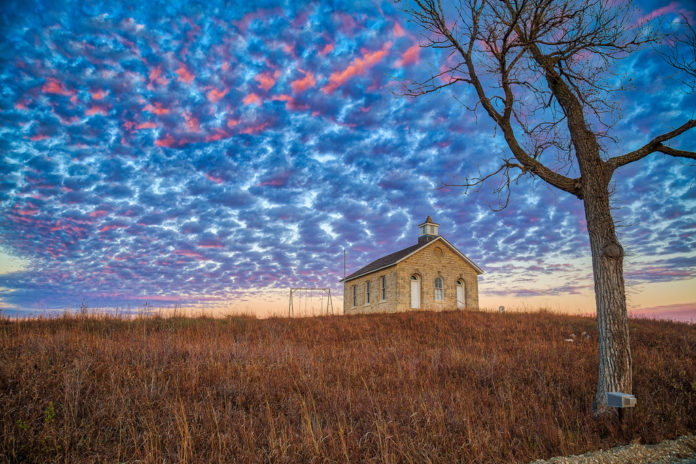Good morning everyone:
It seems like it was a week dominated by Medicaid, which could be a bellwether of the approaching legislative session.
The fault lines started to appear last week as the governor’s budget director clashed with Republican lawmakers over a Senate plan to expand Medicaid.
Then an interim committee recommended conservative policies for Medicaid expansion, which will likely be opposed by the Democratic governor, who has her own task force that will make recommendations about expansion.
So let’s dig in, first starting with the significant stories we published last week and followed up by other stories you need to know but may have missed.
- The week ended on a climactic note late Friday when House Speaker Ron Ryckman Jr. announced that he removed former House Majority Leader Don Hineman as a committee chairman.
- Also Friday, state Rep. Stephanie Clayton ended weeks of speculation by jumping in the race for Senate District 7 against Ethan Corson, the former executive director of the Kansas Democratic Party.
- Attorney General Derek Schmidt declined to opine on how cities might defend their nondiscrimination ordinances against claims that might be brought under the state’s religious freedom statute passed in 2013.
- A special joint committee on Medicaid expansion met for two days last week but didn’t recommend a specific bill. During the hearings, concerns were expressed about how much it would cost to study an expansion proposal developed by the Senate. The budget director angered Republicans with his fiscal assessment of the Senate proposal. And the panel recommended any expansion proposal include work requirements and an ability for health care providers to not provide services they oppose on religious grounds.
- Board of Education member Steve Roberts filed to run for the U.S. Senate.
State’s final CGI bill
The state has settled up its bill with a Canadian information technology company after canceling its contract earlier this year.
The state ended up paying $6.5 million to CGI for invoiced deliverables, which finalized the end of its contracts with the state, a Department of Revenue spokesman said last week.
The final payments included monthly technology services, early termination, transition services, and services performed before termination that hadn’t been invoiced, Zach Fletcher said.
A breakdown of the $6.5 million in final payments was not available.
Earlier this year, Gov. Laura Kelly’s administration ended $111 million in no-bid contracts with CGI after concluding it could not meet its obligations.
The administration ended the contracts about three months after state revenue officials revealed that the company’s system for processing tax returns was running behind schedule.
State officials told legislators in February that the system for processing the tax returns was supposed to go live last October.
As of early February, it still had not gone live, and the company was looking to start testing last summer.
With tax season fast approaching, revenue officials told lawmakers that they had to go back to the old system for handling the returns.
Revenue officials told lawmakers that tax season would have been an “absolute disaster” if the state had proceeded with the software update for processing returns.
The company has stood by its work for the state, saying it recovered millions in additional tax revenue that would have otherwise gone uncollected.
Whipple successor
Soon it will be time for Democrats to pick a replacement for state Rep. Brandon Whipple, who was just elected mayor of Wichita.
While nothing seems to be firm on this front, one name has already surfaced: Stephanie Yeager.
A digital communications specialist, Yeager is the former spokeswoman for congressional candidate James Thompson and the wife of Sedgwick County Democratic Party Chairman Jimmy Yeager.
Reached last week, Stephanie Yeager said she wasn’t actively campaigning to fill Whipple’s District 96 seat in the Legislature.
However, she said she was considering running for the seat, although she wasn’t in a hurry to make a decision.
“I have had several people approach me, and they want me to do it,” said Yeager, a precinct committeewoman. “I am considering it. I feel like I’ve got time.”
Whipple was in his fourth term as a House member representing the district. He was unopposed last year.
“I definitely love this House district, this area of town,” Yeager said. “It’s something I’m thinking about.”
Kansas gets high marks for roads
Yes, Kansas has transferred billions out of the highway department to fund general state operations. And yes, an estimated $18 billion in transportation needs have been identified across Kansas.
But last week, ConsumerAffairs released a report ranking Kansas roads as the second best in the country. 
The state trailed only Wyoming in the quality of roads. It ranked ahead of Minnesota, South Dakota, Montana, Oregon, Washington, Utah, Vermont and Idaho.
The states with the worst roads were South Carolina, Louisiana, Hawaii, Rhode Island, Delaware, Oklahoma, West Virginia, Mississippi, New Mexico and Michigan.
If you are keeping an eye on your neighbors, Missouri was the 35th worst, Iowa was 29th and Nebraska was 31st.
In ranking the states, ConsumerAffairs calculated how much each state spends per mile of road and the number of fatalities in each state.
It factored in the percentage of total capital spending on roadway expansion and repair.
It also surveyed 1,418 consumers across the U.S. about road conditions near them.
The study comes at a time when Kansas lawmakers are gearing up for a new multiyear transportation plan to replace the one that has nearly come to an end.
Kansas: Dangerous for teen drivers
Another report out last week ranked Kansas as one of the riskiest states for teen drivers.
Carinsurance101.com, which provides an online guide to car insurance, reviewed teen driving research and ranked Kansas the 12th most dangerous state for teen drivers.
Topping the list was Montana, followed by Arkansas, Louisiana, Nebraska and North Dakota. Neighboring Missouri ranked sixth. Iowa ranked seventh, and Oklahoma was 11th.
The company scored the states based on the percentage of teens who text and drive, the percentage of teens who drink and drive, the percentage of teens who rarely wear a seat belt and the teen traffic fatality rate per 100,000 teens.
The firm used data from the U.S. Centers for Disease Control and Prevention, the National Highway Safety Administration and the Census Bureau.
The study reported that 48% Kansas teens text and drive (22.4% worse than average) and 6.4% drink and drive (16.4% worse than average).
Five percent of Kansas teens reported rarely wearing a seatbelt, which was about 15% better than the average.
Prisoners & Medicaid
A new audit out Friday found instances where the state gave Medicaid benefits to prisoners even after the payments should have stopped, costing taxpayers thousands of dollars.
The Medicaid inspector general examined 230 cases in which a person admitted to the Topeka Correctional Facility received Medicaid benefits when they entered prison.
In 54 of those cases reviewed during fiscal year 2019, Medicaid eligibility was discontinued late or not at all. In the other 176 cases, Medicaid benefits were cut off in a timely manner.
The audit found $184,997 in monthly Medicaid payments that were made for jailed beneficiaries within the sample that was studied. Generally, federal law bars anyone who is incarcerated from receiving Medicaid.

The most extreme case involved a prisoner booked into jail in 2018 and who was later transferred to the Topeka facility, which houses women.
Although the prisoner’s Social Security number and birth date were the same in the Corrections and Medicaid systems, her last name was different in the KDOC system.
There was no indication that the KanCare Clearinghouse, which processes medical assistance applications, was ever aware that the woman was in jail.
The audit said there appeared to be a trend in delinquent processing of Corrections Department data in the fall of 2018.
Twenty-eight beneficiaries who entered Topeka Correctional Facility between July and September 2018 were not sent discontinuation notices until the end of October, meaning their benefits didn’t end until November.
KanCare Clearinghouse staff indicated that in those cases, the Corrections Department data file was processed timely, but the work needed to end the benefit was not completed in a timely fashion.
The state health and corrections departments have a data-sharing agreement. It allows the health department to receive regular updates on the state prison population.
At the start of each month, the health department receives a data file from corrections that includes prison population information for the preceding month.
This file is generated and sent to the health department automatically without further action from corrections staff.
Through an automated process, that data file is compared and matched against Medicaid eligibility data.
The automated matching process first attempts to match Social Security numbers in both files. If there is no match, the first name, last name and date of birth are compared and matched.
If a match is found through the automated process, a task is routed to the KanCare Clearinghouse work queue.
The Clearinghouse staff is required to verify incarceration status. If the Clearinghouse verifies that the beneficiary is incarcerated, it is supposed to send a written notice to discontinue eligibility effective the last day of the month.
2nd Congressional District developments
The Democratic mayor of Topeka has long been rumored to be a possible candidate for the 2nd Congressional District seat held by Republican Steve Watkins.
Last week, the Topeka newspaper officially confirmed that Michelle De La Isla is looking at the race. Democrats were left without a candidate when Abbie Hodgson had to withdraw because of fundraising troubles.
The Kansas City Star followed up on that story with something similar, exploring the Democrats’ chances of winning the seat back after former state Rep. Paul Davis came within an eyelash of defeating Watkins last fall.
Amanda Adkins & Cerner
The Kansas City Star looks at the potential conflicts posed by Republican congressional candidate Amanda Adkins’ work at Cerner.
Medicaid expansion news
National politics: Stateline examines the shifting politics of Medicaid expansion as more and more states are becoming more amenable to expanding health care for the poor. Democratic governors are replacing Republicans who opposed expansion. And other states — perhaps even Kansas — are moving in that direction.
Montana: Officials won’t be able to impose work requirements for beneficiaries of Medicaid expansion by Jan. 1 as originally hoped. The state still awaits federal approval. More coverage from the Helena newspaper and from Modern Healthcare.
Foster care lawsuit
Kansas News Service has this latest development in the unfolding federal class-action lawsuit over the state’s foster care system. KNS reports that Gov. Laura Kelly had made a motion to withdraw as a defendant in this case.
Court records show that the governor is invoking sovereign immunity in the case. “The Governor of the State of Kansas plays no direct role in the administration of the programs that Plaintiffs now challenge,” the governor argues in her motion.
Disparities in tariff relief
A Democratic report out of the U.S. Senate last week criticized how the Trump administration apportioned money aimed at offsetting the impact of retaliatory tariffs.
The report, released by Senate Democrats, suggests more money is going to southern states that have suffered less damage from international trade hostilities than other parts of the country.
The report says that Georgia farmers top the list, receiving more than $50 per acre from the so-called Market Facilitation Program. It was followed by Mississippi, Alabama, Tennessee and Arkansas.
Kansas ranked 22nd on the list, receiving about $20 an acre. Neighboring Iowa was ninth at about $30 an acre, while Missouri was 10th at a little less than $30 per acre.
Farmers in Georgia received more than $50 per acre in the first round of 2019 payments, the report said, while farmers in 34 other states received $25 or less.
The Democrats’ report says the distribution of the tariff subsidies has created disparities across the country.
The report found that tariff subsidies equaled or exceeded $100 per acre in only 193 counties, of which 184 were in southern states.
Meanwhile, there were 402 counties with the minimum payment rate of $15 per acre, of which 308 were states in the Midwest and elsewhere.
For its part, the U.S. Department of Agriculture said payments are calculated based on trade damage, not regions or the size of a farm.
Here’s more coverage of the report from The Associated Press, the Atlanta Journal-Constitution and The Kansas City Star.
Also, here are audio interviews that Iowa Agribusiness Radio Network did with U.S. Sen. Debbie Stabenow of Michigan, who spearheaded the report, and a deputy secretary at the U.S. Department of Agriculture, who explained how the money is allocated.
Pew polling
A couple relevant polls for the world of Kansas politics that were released by Pew Research in the last week.
One survey found that while most people believe that religion plays an important role in the broad fabric of American life, many have a different idea about its role in politics.
A second poll shows that two-thirds of Americans believe marijuana should be legalized.
Here and there
Via Twitter, Lauren Martin announced that she’s leaving the Kansas Democratic Party as its political and data director.
Martin said she’s taken a job with the National Auctioneers Association and will be leaving at the end of the month.
“My time working for the party has been incredible,” she wrote on Twitter. “I’ve learned so much about this state and grassroots organizing. Most importantly, I’ve met so many amazing Democrats who are doing great work.”
Martin has been with the Democratic Party since February 2018. She also ran Logan Heley’s campaign for Overland Park City Council.













